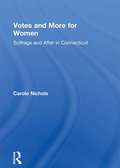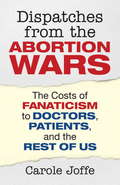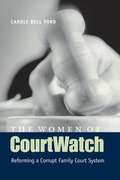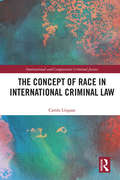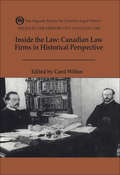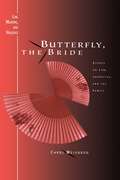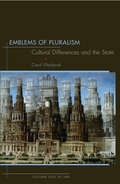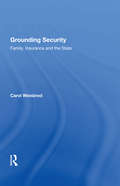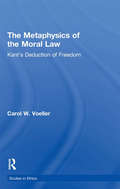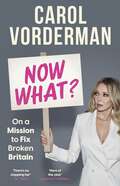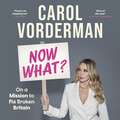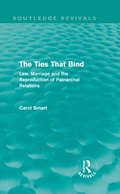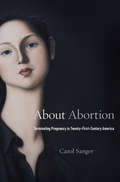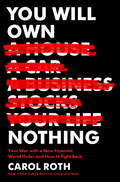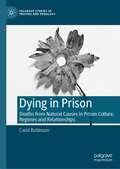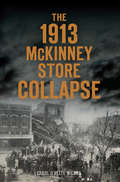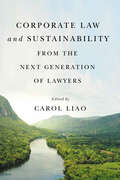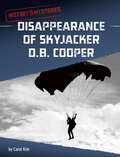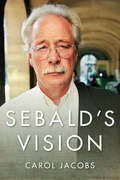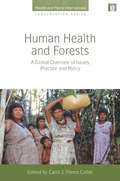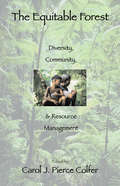- Table View
- List View
Votes and More for Women: Suffrage and After in Connecticut
by Carole NicholsThis fascinating book demonstrates the diversity of Connecticut’s women’s feminist activities in pre- and post-suffrage eras and refutes the notion that feminist activism died out with the passage of the Nineteenth Amendment.
A Touch of Notoriety: The Most Coveted Prize The Power Of Vasilii A Touch Of Notoriety A Taste Of The Forbidden (Buenos Aires Nights #2)
by Carole MortimerAn Entertainment Weekly Top 10 Romance AuthorRules are made to be brokenBeth Blake used to have a perfectly normal life in London until a secret from the past thrusts her into notoriety and she finds herself in Argentina under thewatchful eye of a bodyguard. Controlling, insufferable and sinfully sexy to boot, Raphael Cordoba is a thorn in her independent side!Guarding Beth should be easy for Raphael—as longas he remembers the golden rule: do not touch the client, especially when she's the sister of your best friend! But feisty Beth requires a particular attentiveness that brings the illicit temptation of her even closer….
Dispatches from the Abortion Wars
by Carole JoffeSurprising firsthand accounts from the front lines of abortion provision reveal the persistent cultural, political, and economic hurdles to access More than thirty-five years after women won the right to legal abortion, most people do not realize how inaccessible it has become. In these pages, reproductive-health researcher Carole Joffe shows how a pervasive stigma--cultivated by the religious right--operates to maintain barriers to access by shaming women and marginalizing abortion providers. Through compelling testimony from doctors, health-care workers, and patients, Joffe reports the lived experiences behind the polemics, while also offering hope for a more compassionate standard of women's health care. From the Trade Paperback edition.
The Women of CourtWatch: Reforming a Corrupt Family Court System
by Carole Bell FordHouston was a terrible place to divorce or seek child custody in the 1980s and early 1990s. Family court judges routinely rendered verdicts that damaged the interests of women and children. In some especially shocking cases, they even granted custody to fathers who had been accused of molesting their own children. Yet despite persistent allegations of cronyism, incompetence, sexism, racism, bribery, and fraud, the judges wielded such political power and influence that removing them seemed all but impossible. The family court system was clearly broken, but there appeared to be no way to fix it.
The Concept of Race in International Criminal Law (International and Comparative Criminal Justice)
by Carola LingaasMembers of racial groups are protected under international law against genocide, persecution, and apartheid. But what is race – and why was this contentious term not discussed when drafting the Statute of the International Criminal Court? Although the law uses this term, is it legitimate to talk about race today, let alone convict anyone for committing a crime against a racial group? This book is the first comprehensive study of the concept of race in international criminal law. It explores the theoretical underpinnings for the crimes of genocide, apartheid, and persecution, and analyses all the relevant legal instruments, case law, and scholarship. It exposes how the international criminal tribunals have largely circumvented the topic of race, and how incoherent jurisprudence has resulted in inconsistent protection. The book provides important new interpretations of a problematic concept by subjecting it to a multifaceted and interdisciplinary analysis. The study argues that race in international criminal law should be constructed according to the perpetrator's perception of the victims’ ostensible racial otherness. The perpetrator’s imagination as manifested through his behaviour defines the victims’ racial group membership. It will be of interest to students and practitioners of international criminal law, as well as those studying genocide, apartheid, and race in domestic and international law.
Inside the Law: Canadian Law Firms in Historical Perspective
by Carol WiltonLaw firms are important economic institutions in this country: they collect hundreds of millions of dollars annually in fees, they order the affairs of businesses and of many government agencies, and their members include some of the most influential Canadians. Some firms have a history stretching back nearly two hundred years, and many are over a century old. Yet the history of law firms in Canada has remained largely unknown. This collection of essays, Volume VII in the Osgoode Society's series of Essays in the History of Canadian Law, is the first focused study of a variety of law firms and how they have evolved over a century and a half, from the golden age of the sole practitioner in the pre-industrial era to the recent rise of the mega-firm. The volume as a whole is an exploration of the impact of economic and social change on law-firm culture and organization. The introduction by Carol Wilton provides a chronological overview of Canadian law-firm evolution and emphasizes the distinctiveness of Canadian law-firm history.
Butterfly, the Bride: Essays on Law, Narrative, and the Family
by Carol WeisbrodCarol Weisbrod uses a variety of stories to raise important questions about how society, through law, defines relationships in the family. Beginning with a story most familiar from the opera Madame Butterfly, Weisbrod addresses issues such as marriage, divorce, parent-child relations and abuses, and non-marital intimate contact. Each chapter works with fiction or narratives inspired by biography or myth, ranging from the Book of Esther to the stories of Kafka. Weisbrod frames the book with running commentary on variations of the Madame Butterfly story, showing the ways in which fiction better expresses the complexities of intimate lives than does the language of the law. Butterfly, the Bride looks at law from the outside, using narrative to provide a fresh perspective on the issues of law and social structure---and individual responses to law. This book thoroughly explores relationships between inner and public lives by examining what is ordinarily classified as the sphere of private life---the world of family relationships.
Emblems of Pluralism: Cultural Differences and the State (The Cultural Lives of Law)
by Carol WeisbrodFrom outlawing polygamy and mandating public education to protecting the rights of minorities, the framing of group life by the state has been a subject of considerable interest and controversy throughout the history of the United States. The subject continues to be important in many countries. This book deals with state responses to cultural difference through the examination of a number of encounters between individuals, groups, and the state, in the United States and elsewhere. The book opens the concepts of groups and the state, arguing for the complexity of their relations and interpenetrations. Carol Weisbrod draws on richly diverse historical and cultural material to explore various structures that have been seen as appropriate for adjusting relations between states and internal groups. She considers the experience of the Mormons, the Amish, and Native Americans in the United States, the Mennonites in Germany, and the Jews in Russia to illustrate arrangements and accommodations in different times and places. The Minorities Treaties of the League of Nations, political federalism, religious exemptions, nonstate schools, and rules about adoption are among the mechanisms discussed that sustain cultural difference and create frameworks for group life, and, finally, individual life. At bottom, Emblems of Pluralism concerns not only relations between the state and groups, public and private, but also issues of identity and relations between the self and others.
Grounding Security: Family, Insurance and the State (Law, Justice And Power Ser.)
by Carol WeisbrodThis book examines some of the mechanisms which are currently conceived as affording individual security. The idea of security includes emotional and financial components. These interconnect so that such common concepts as 'trust' in someone and 'care taking' include both ideas of emotional and financial support. State policies on security rest on perceptions of two other institutions, the family and insurance, both of which are subject to change. At one time the extended family was seen as a major security-providing institution, but the contemporary nuclear family is more fragile. The concept of insurance originally entailed ideas of community and mutual aid; however, the institution has developed, in its modern private form, as a profit-driven entity. This book addresses various uses of state power in providing security for individuals, and outlines different ways in which this can be done.
The Metaphysics of the Moral Law: Kant's Deduction of Freedom (Studies in Ethics)
by Carol W. VoellerThis work offers a new understanding of Kant on the freedom of the will. Voeller looks in detail at the Groundwork of the Metaphysics of Morals and the Critique of Practical Reason against the background of Kant's critical philosophy as a whole.
Now What?: On a Mission to Fix Broken Britain
by Carol VordermanPolitics: The three vowels and five consonants which control our world.'But what has politics got to do with me?' I hear you ask. Well, quite a lot really. Whether you like it or not, it affects every single thing in your life from the moment you wake up in the morning until you crawl into bed at night.But some of our political elite make it feel like a club which we have not been invited to join. The privileged few who want to keep it all for the privileged few. I hope this book can explain much, make you laugh out loud and make you realise that together our voices are powerful.Buckle up and come on a political rollercoaster with me - 'an old bird with an iPhone'. This is a book for people who don't normally think about politics. We have a new government and have bid a loud goodbye to the Tories, but the issues that allowed the last government to mismanage and deceive us for so long lie deep. Amidst a landscape of economic turmoil and deepening societal fractures, we need to see a new age of accountability in our political system.With her characteristic outspokenness and irrepressible sense of humour, in Now What? On a Mission to Fix Broken Britain, Carol Vorderman exposes the intricate web of influence responsible for our nation's unravelling and provides us with a toolkit for building a better and fairer Britain.Part diary, part manifesto, part journey down the rabbit hole of British politics, this is the story of how 'an old bird with an iPhone' exposed the incompetence and lies of the establishment, and inspired countless others to find their voice and stand up for what they believe in.
Now What?: On a Mission to Fix Broken Britain
by Carol VordermanPolitics: The three vowels and five consonants which control our world.'But what has politics got to do with me?' I hear you ask. Well, quite a lot really. Whether you like it or not, it affects every single thing in your life from the moment you wake up in the morning until you crawl into bed at night.But some of our political elite make it feel like a club which we have not been invited to join. The privileged few who want to keep it all for the privileged few. I hope this book can explain much, make you laugh out loud and make you realise that together our voices are powerful.Buckle up and come on a political rollercoaster with me - 'an old bird with an iPhone'. This is a book for people who don't normally think about politics. We have a new government and have bid a loud goodbye to the Tories, but the issues that allowed the last government to mismanage and deceive us for so long lie deep. Amidst a landscape of economic turmoil and deepening societal fractures, we need to see a new age of accountability in our political system.With her characteristic outspokenness and irrepressible sense of humour, in Now What? On a Mission to Fix Broken Britain, Carol Vorderman exposes the intricate web of influence responsible for our nation's unravelling and provides us with a toolkit for building a better and fairer Britain.Part diary, part manifesto, part journey down the rabbit hole of British politics, this is the story of how 'an old bird with an iPhone' exposed the incompetence and lies of the establishment, and inspired countless others to find their voice and stand up for what they believe in.
Now What?: On a Mission to Fix Broken Britain
by Carol VordermanPolitics: The three vowels and five consonants which control our world.'But what has politics got to do with me?' I hear you ask. Well, quite a lot really. Whether you like it or not, it affects every single thing in your life from the moment you wake up in the morning until you crawl into bed at night.But some of our political elite make it feel like a club which we have not been invited to join. The privileged few who want to keep it all for the privileged few. I hope this book can explain much, make you laugh out loud and make you realise that together our voices are powerful.Buckle up and come on a political rollercoaster with me - 'an old bird with an iPhone'. This is a book for people who don't normally think about politics. We have a new government and have bid a loud goodbye to the Tories, but the issues that allowed the last government to mismanage and deceive us for so long lie deep. Amidst a landscape of economic turmoil and deepening societal fractures, we need to see a new age of accountability in our political system.With her characteristic outspokenness and irrepressible sense of humour, in Now What? On a Mission to Fix Broken Britain, Carol Vorderman exposes the intricate web of influence responsible for our nation's unravelling and provides us with a toolkit for building a better and fairer Britain.Part diary, part manifesto, part journey down the rabbit hole of British politics, this is the story of how 'an old bird with an iPhone' exposed the incompetence and lies of the establishment, and inspired countless others to find their voice and stand up for what they believe in.
The Ties That Bind: Law, Marriage and the Reproduction of Patriarchal Relations (Routledge Revivals)
by Carol SmartFirst published in 1984, this book made an important and timely contribution to the development of the idea that the law is a major source of women’s oppression. Based on research of the theory and practice of family law, it examines the way in which private law operates to sustain, reproduce and reinforce the dependence of women in the most private of spheres, namely marriage. The author focuses on the point of break down or divorce, where the economic vulnerability of women caused by marriage and the sexual division of labour is most clearly expressed. She points to the way in which the law, while mitigating the worst excesses of men’s power over women in marriage, has consistently failed to tackle the economic structure of marriage and women’s fundamental material vulnerability inside the family. She confronts various myths on divorce legislation in Britain and discusses alternative feminist proposals for tackling the problems caused by women’s economic dependence in marriage. Although Smart writes in 1984, many of the issues she discusses retain their significance in today’s society.
About Abortion: Terminating Pregnancy in Twenty-First Century America
by Carol SangerNew medical technologies, women’s willingness to talk online and off, and tighter judicial reins on state legislatures are shaking up the practice of abortion. As talk becomes more transparent, Carol Sanger writes, women’s decisions about whether to become mothers will be treated more like those of other adults making significant personal choices.
Courting Death
by Carol S. SteikerRefusing to eradicate the death penalty, the U.S. has attempted to reform and rationalize capital punishment through federal constitutional law. While execution chambers remain active in several states, Carol Steiker and Jordan Steiker argue that the fate of the American death penalty is likely to be sealed by this failed judicial experiment.
The Metaphysics and Ethics of Relativism
by Carol RovaneRelativism is a hotly contested doctrine among philosophers, some of whom regard it as neither true nor false but simply incoherent. As Carol Rovane demonstrates in this analytical tour-de-force, the way to defend relativism is not initially by establishing its truth but by clarifying its content. The Metaphysics and Ethics of Relativism elaborates a doctrine of relativism that has a consistent logical, metaphysical, and practical significance. Relativism is worth debating, Rovane contends, because it bears directly on the moral choices we make in our lives. Three intuitive conceptions of relativism have been influential in philosophical discourse. These include the idea that certain unavoidable disagreements are irresolvable, leading to the conclusion that "both sides are right," and the idea that truth is always relative to context. But the most compelling, Rovane maintains, is the "alternatives intuition. " Alternatives are truths that cannot be embraced together because they are not universal. Something other than logical contradiction excludes them. When this is so, logical relations no longer hold among all truth-value-bearers. Some truths will be irreconcilable between individuals even though they are valid in themselves. The practical consequence is that some forms of interpersonal engagement are confined within definite boundaries, and one has no choice but to view what lies beyond those boundaries with what Rovane calls "epistemic indifference. " In a very real sense, some people inhabit different worlds--true in themselves, but closed off to belief from those who hold irreducibly incompatible truths.
You Will Own Nothing: Your War with a New Financial World Order and How to Fight Back
by Carol RothThe New York Times bestselling author and entrepreneur investigates what would happen if a new financial world order took hold, one in which global elites own everything and you own nothing—and yet you are somehow happy. When Carol Roth first heard that one of the World Economic Forum’s predictions for 2030 was “You will own nothing, and be happy,” she thought it was an outlandish fantasy. Then, she researched it. What she found was that a number of businesses, governments, and global elites share a vision of a future that sounds utopian: Everyone will have everything they need, and no one will own anything.From declines in home and vehicle ownership to global inflation and government spending, many of the trends of modern life reveal that a new world that is emerging—one in which Western citizens, by choice or by circumstance, increasingly do not own possessions or accumulate wealth. It’s the perfect economic environment for the rich and powerful to solidify their positions and prevent anyone else from getting ahead.In You Will Own Nothing¸ Roth reveals how the agendas of Wall Street, world governments, international organizations, socialist activists, and multinational corporations like Blackrock all work together to reduce the power of the dollar and prevent millions of Americans from taking control of their wealth. She shows why owning fewer assets makes you poorer and less free. This book is essential guide to protecting your hard-earned wealth for the coming generations.
Dying in Prison: Deaths from Natural Causes in Prison Culture, Regimes and Relationships (Palgrave Studies in Prisons and Penology)
by Carol RobinsonThis book uses empirical data gathered using ethnographic methods in two contrasting prisons to provide a rare insight into death and dying in prisons in the UK. The majority of deaths in prison custody in England and Wales result from natural causes, yet the experiences of people dying in prison and the impact of these deaths on the wider prison are under-researched areas. It provides a novel insight into the impact of deaths from natural causes on the prison as an institution and challenges existing work juxtaposing occupational philosophies of ‘care’ and ‘control’. It also identifies how end of life care is provided in prisons and the impact this has on culture and relationships shows how deaths from natural causes in prison custody ‘soften’ prison regimes, culture and relationships. It speaks to an international audience by drawing on the global literature including from the US.
The 1913 McKinney Store Collapse (Disaster)
by Carol O'Keefe WilsonA powerful vibration, a deafening noise and a swell of thick dust brought residents of McKinney pouring into the public square on the afternoon of January 23, 1913. What they saw was horrifying--an entire building had collapsed, demolishing two popular retailers, the Cheeves Mississippi Store and Tingle Implement Store. Their contents, including many shoppers and clerks, spilled out into the streets, where layer upon layer of debris settled into a massive, ragged pile. In spite of a herculean rescue effort, eight people perished. Carol Wilson sifts through the disaster and its aftermath, dredging up some troubling facts about how the tragedy might have been prevented.
Corporate Law and Sustainability from the Next Generation of Lawyers
by Carol LiaoMillennials have come of age in an era when environmental and social crises have defined much of their adult lives, as has the recurrent message that time is of the essence. Future generations will bear the greatest burden created by climate change, pandemics, and inequality, but often they are not in positions of power to make impactful decisions about it.This book gives voice to young lawyers offering new critical perspectives in the burgeoning field of corporate law and sustainability. Climate change is an intergenerational crisis, and the solutions and path forward must include intergenerational voices. Millennials are coming of age at a critical juncture in our climate and corporate history, and their perspectives stand apart from those who have been trained into myopic views of what constitutes change. These essays challenge the status quo across a number of pressing topics, including executive compensation, board diversity, decolonialization, crowdfunding, social media risk, corporate lobbying, shareholder activism, tax avoidance, global supply chain management, and human rights, written with a level of thoughtfulness and urgency that demands attention from policymakers and scholars alike.Edited by Carol Liao, a leading expert in the field, and with a foreword by author and filmmaker of The Corporation and The New Corporation Joel Bakan, this book offers timeless research from a diverse group of young lawyers calling for bona fide corporate accountability within legal and regulatory frameworks, including innovative ideas for reform.
Disappearance of Skyjacker D. B. Cooper (History's Mysteries)
by Carol KimOn November 24, 1971, a man boarded a passenger plane in Portland, Oregon. Later, he would become known as D. B. Cooper. But that wasn’t his real name, and he was no ordinary passenger. He hijacked the plane, demanded $200,000, and parachuted out of the plane with the money. He was never seen again. Who was D. B. Cooper, and what happened to him? Explore the theories behind this crime and why it has become one of history’s greatest mysteries.
Sebald's Vision (Literature Now)
by Carol JacobsW. G. Sebald's writing has been widely recognized for its intense, nuanced engagement with the Holocaust, the Allied bombing of Germany in WWII, and other episodes of violence throughout history. Through his inventive use of narrative form and juxtaposition of image and text, Sebald's work has offered readers new ways to think about remembering and representing trauma.In Sebald's Vision, Carol Jacobs examines the author's prose, novels, and poems, illuminating the ethical and aesthetic questions that shaped his remarkable oeuvre. Through the trope of "vision," Jacobs explores aspects of Sebald's writing and the way the author's indirect depiction of events highlights the ethical imperative of representing history while at the same time calling into question the possibility of such representation. Jacobs's lucid readings of Sebald's work also consider his famous juxtaposition of images and use of citations to explain his interest in the vagaries of perception. Isolating different ideas of vision in some of his most noted works, including Rings of Saturn, Austerlitz, and After Nature, as well as in Sebald's interviews, poetry, art criticism, and his lecture Air War and Literature, Jacobs introduces new perspectives for understanding the distinctiveness of Sebald's work and its profound moral implications.
Human Health and Forests: A Global Overview of Issues, Practice and Policy (People and Plants International Conservation)
by Carol J. Pierce ColferHundreds of millions of people live and work in forests across the world. One vital aspect of their lives, yet largely unexamined, is the challenge of protecting and enhancing the unique relationship between the health of forests and the health of people. This book, written for a broad audience, is the first comprehensive introduction to the issues surrounding the health of people living in and around forests, particularly in Asia, South America and Africa. Part I is a set of synthesis chapters, addressing policy, public health, environmental conservation and ecological perspectives on health and forests (including women and child health, medicinal plants and viral diseases such as Ebola, SARS and Nipah Encephalitis). Part II takes a multi-lens approach to lead the reader to a more concrete and holistic understanding. It features case studies from around the world that cover important issues such as the links between HIV/AIDS and the forest sector, and between diet and health. Part III looks at the specific challenges to health care delivery in forested areas, including remoteness and the integration of traditional medicine with modern health care. The generous use of boxes with specific examples adds layers of depth to the analyses. The book concludes with a synthesis designed for use by practitioners and policymakers to work with forest dwellers to improve their health and their ecosystems. This book is a vital addition to the knowledge base of all professionals, academics and students working on forests, natural resources management, health and development worldwide. Published with CIFOR and People and Plants International
The Equitable Forest: Diversity, Community, and Resource Management
by Carol J. Pierce ColferWhile there continues to be refinement in defining and assessing sustainable management, there remains the urgent need for policies that create the conditions that support sustainability and can halt or slow destructive practices already underway. Carol Colfer and her contributors maintain that standardized solutions to forest problems from afar have failed to address both human and environmental needs. Such approaches, they argue, often neglect the knowledge that local stakeholders have accumulated over generations as forest managers and do not address issues involving the diversity and well-being of groups within communities. The contributors note that these problems persist despite clear evidence that equity and social relationships, including gender roles, are important factors in the ways that communities adapt to change and manage forest resources overall. The Equitable Forest offers an alternative to traditional, externally organized strategies for forest management. Termed adaptive collaborative management (ACM), the approach tries to better acknowledge the diversity, complexity, and unpredictability of human and natural systems. ACM works to strengthen local institutions and use the knowledge and capacity of groups in local communities to enhance the health and well-being of both forests and the people who live in and around them. The Equitable Forest provides a detailed explanation of the descriptive, analytical, and methodological tools of ACM, along with accounts of early stages of its implementation in tropical regions of Asia, Africa, and Latin America. Although the contributors make it clear that it is too soon to evaluate the efficacy of ACM, their work is supported by evidence that rural communities do make important contributions when involved in formal forest management; that management strategies are most effective when flexible and tailored to local contexts; and that efforts by outside governmental and nongovernmental organizations to support local management are feasible from the policymaking perspective, and desirable for their impact on human, economic, and environmental well-being.
